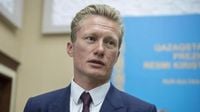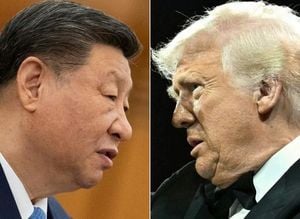In a surprising turn of events, legendary cyclist Alexander Vinokurov has found himself entangled in a bureaucratic struggle to secure the pension benefits he is entitled to as an Olympic champion. Despite his illustrious career, which includes representing Kazakhstan since 1991, Vinokurov revealed that he must independently prove his work experience to access the monthly payments mandated by law.
In a candid interview on the Dope Soz podcast, Vinokurov shared his frustrations regarding the challenges he faces in confirming his two decades of service with the national team. "I’ve been with the Kazakhstan national team since 1991. And now I’m going around collecting documents to prove that I’ve worked for 20 years. The salary is, of course, luxurious — around 350-400 thousand tenge," he mentioned, highlighting the irony of having to chase paperwork for a benefit that should be automatic for someone of his stature.
The monthly pension payments, known as the Olympic stipend, are reserved for Olympic champions, Paralympians, and world champions in Olympic sports, along with their coaches, provided they have at least 20 years of experience in physical culture and sports within Kazakhstan. This regulation is strictly enforced by the Committee on Sports and Physical Culture, which has reiterated that the process for assigning benefits is uniform for all athletes.
To qualify for these payments, Vinokurov must compile a comprehensive set of documents, including his identity document, an application for material support, and proof of his work experience. Acceptable forms of evidence include a work book, employment contracts, payroll statements, and even an archival certificate of employment. Additionally, he must submit a copy of the protocol from competitions confirming his status as a champion or prize-winner in the Olympics or World Championships.
As of now, the Ministry of Culture and Sports is actively working to verify Vinokurov's documentation. A representative from the Ministry stated, "The procedure for receiving payments is the same for everyone. Payments can only be assigned if there is confirmed experience of at least 20 years." This stringent requirement, while aimed at ensuring that only deserving athletes receive benefits, has put Vinokurov in a position where he feels the need to justify his legacy.
The current legislation stipulates that the monthly payment amounts to 100 MRP (monthly calculation index), which translates to approximately 368,000 tenge in 2025. This figure underscores the importance of these benefits for retired athletes who have dedicated their lives to the sport.
Vinokurov’s situation raises broader questions about the support system for athletes in Kazakhstan. Despite their contributions to national pride and sports achievements, many athletes find themselves navigating complex bureaucratic hurdles when transitioning from competitive sports to retirement. The need for clearer pathways to access benefits is evident, especially for those like Vinokurov, who have represented their country on the world stage.
In the podcast, Vinokurov also touched on issues surrounding sports financing in Kazakhstan. He emphasized the necessity for better funding and support for athletes, particularly those who have achieved Olympic success. "There needs to be a system in place that honors our achievements without making us jump through hoops," he stated, highlighting the disconnect between the recognition of athletes and the actual support they receive.
As he continues to gather the required documents, Vinokurov remains hopeful that his situation will be resolved soon. His commitment to proving his eligibility for the pension reflects not only his personal resolve but also the broader struggles faced by many retired athletes in Kazakhstan.
In conclusion, Alexander Vinokurov’s ongoing battle to secure his rightful pension benefits serves as a poignant reminder of the challenges faced by Olympic athletes after their competitive careers. While the system is designed to recognize and reward their hard work, the bureaucratic processes can often overshadow their achievements, leaving them to fight for what they have earned. As the situation develops, it will be interesting to see how the authorities address these systemic issues and whether Vinokurov will finally receive the support he deserves.




